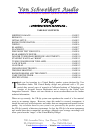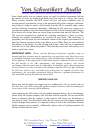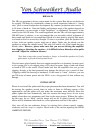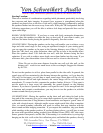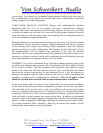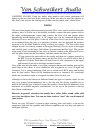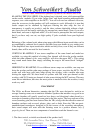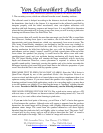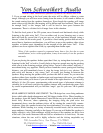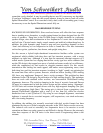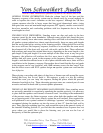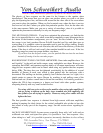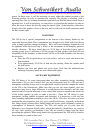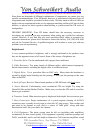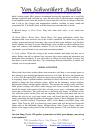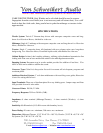
Von Schweikert Audio
930 Armorlite Drive, San Marcos, CA 92069
Ph (760)410-1650 Fax (760)410-1655
E-mail:albertvonn@aol.com
World Class Reference Speaker Systems for Music and Film
~ Website:www.vonschweikert.com
8
2. The secondary waves, which are reflected from the room’s boundary surfaces.
The reflected sound is delayed according to the distances involved from the speaker to
the boundaries, then back to the listener. It is important for the reflected sound-field to
integrate properly with the initial wavelaunch, since out-of-phase reflections will
interfere with both frequency response and image focus. It is not difficult to determine
where the best placement will be in any given room, since you will be using a pink noise
listening test discussed later. See Pink Noise Test.
In every room, there will usually be more than one magic spot for the VRs to sound their
best. However, finding those spots is not intuitive, due to the nature of reverberation
characteristics and room dimensions, which vary enormously from room to room. The
VRs, being Virtual Reality simulators, are designed to load the room very similarly to
the way a live instrument would load the room. Only in this way can your ear/brain
hearing mechanism be lulled into believing that you could be listening to an actual
performance, and not simply ‘canned’ sound. If you had a grand piano at the end of the
room where the speakers are playing, it would involve the entire room with semi-
omnidirectional sound, and your ear/brain hearing mechanism will clearly know this.
The VR Virtual Reality design will simulate this huge soundfield, with its involving
depth and dimension. However, correct placement is required to achieve the best
possible sound quality. Amazingly, moving the speaker only a few inches can make the
difference between good sound and great sound due to the reflective properties of your
room! Note that this fact is true with any speaker system.
PINK NOISE TEST TO FIND FOCAL POINT OF ARRAY: Since the VR-4 Series is
Quasi-Time Aligned by use of the specialized Global Axis Integration Network
TM
crossover circuit and thus results in a focused phase-array driver complement, there is an
optimum seating distance. If you must situate the speakers close together, with a close
listening position for near field applications, such as in a recording studio, you may have
to toe the speakers out slightly if you find that the image is “bunched” together towards
the center. In order to find the focus point of the array, use the following technique:
PINK NOISE LISTENING TEST FOR FOCUS: Play a pink noise source such as a CD
with test tones or an FM tuner set between stations (with muting turned off). You will
notice one of two sonic effects when listening to pink noise:
1. If you are in the focal point of the array, you will hear a “ball” of noise that appears
to float between the speakers. Although noise will appear to emanate from the speakers
themselves, the center image will be stronger, with a slightly different tone quality to the
phantom center image. The sound from the speakers themselves will seem slightly
detached from the pink noise ball, and slightly softer in volume level. The center “ball”
of sound will be very strong, and you will be able to detect that the “ball” of sound is
round, with depth to the image. This is a ‘locked in’ image with correct focus.



